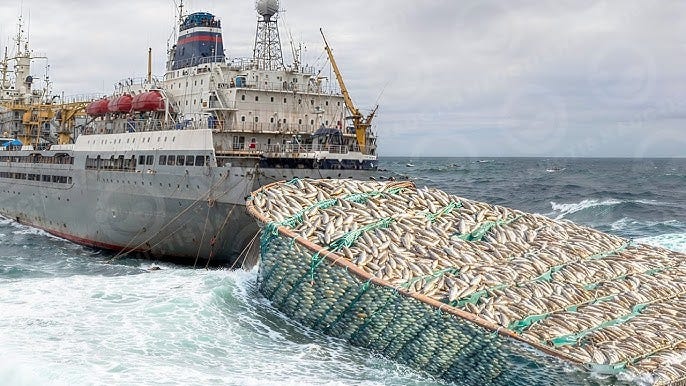Oceans: High Seas Treaty Nears Enforceability with 50+ Ratifications, Protecting Half the Planet’s Ocean as US Sits Out
The third UN Conference on the Oceans revealed more than progress on marine sanctuaries—it exposed US withdrawal from ocean governance, possibly ceding leadership to China by the time of UNOC4
Concluding in Nice, France, on June 13, 2025, the third UN Conference on the Oceans revealed more than progress on marine protection1—it exposed America’s withdrawal from international participation in issues related to climate change, the environment or more broadly, care for the planet. Though ocean governance it seems, has fallen into safe hands, with a gutsy keynote by President Macron of France, and a reassuring word from former US special envoy for climate change John Kerry, a reminder of an America past.

Sixty nations are required to be signatories for ratification of the High Seas Treaty, fifty-one had signed by the conference’s end. French Polynesia established the world’s largest marine protected area, and over 800 new conservation pledges were announced. Yet beneath these victories lies a more consequential story: America’s conspicuous barring of its scientists from attending and refusal to send a delegation to the meeting. This might have created a geopolitical vacuum in one of the planet’s most critical domains but for the emergence of new leadership in the wings - leadership that is unlikely to step aside by the time of the next conference in 2028 in Korea and Chile.
When Leadership Goes Missing
The United States didn’t just skip the high-level talks—it actively prevented its own scientists from participating. This wasn’t mere diplomatic neglect; it was a deliberate retreat from multilateral ocean governance at precisely the moment when global cooperation became more crucial than ever. While 170+ countries united behind the “Nice Ocean Action Plan,” America stood conspicuously on the sidelines.
The timing couldn’t be more consequential. With climate change accelerating ocean acidification, rising sea levels threatening coastal nations, and marine biodiversity facing collapse, the world desperately needs coordinated scientific leadership. America’s withdrawal doesn’t just leave a gap—it actively undermines the global unity essential for addressing planetary-scale challenges.
China Steps Into the Void
Where America retreated, China advanced. Beijing ratified the Port State Measures Agreement to combat illegal fishing, demonstrating the kind of multilateral engagement that builds influence and trust. While away from the conference, the US is actively promoting harmful deep-sea mining enabled by President Trump’s April executive order—explicitly disregarding international law—by way of contrast, China positioned itself as a defender of established maritime governance frameworks.
This represents a fundamental shift in ocean leadership dynamics. For decades, American scientific institutions and diplomatic influence shaped global marine policy. Now, as the US prioritizes economic nationalism over multilateral cooperation, China is methodically building the relationships and reputation that likely will translate into long-term geopolitical influence.

The New Maritime Coalition
America’s absence has accelerated the emergence of alternative leadership structures. European nations are stepping up dramatically—the EU pledged €10 million for High Seas Treaty implementation and €1 billion through its Ocean Pact. Germany committed €100 million to clear underwater munitions. France and Brazil launched the “Blue NDC Challenge” integrating ocean solutions into climate policy.
ASEAN nations, Latin American countries, and African coastal states are no longer waiting for American leadership. Panama and Canada led a 37-nation coalition on underwater noise pollution. Panama and South Korea joined the 100% Alliance for sustainable ocean management. These aren’t just environmental initiatives—they’re the building blocks of a new international order where middle powers are taking over the space America once occupied and influenced.
The Science Exodus
Perhaps most damaging is America’s self-imposed scientific isolation. By barring it’s scientists from participating, the US has essentially excluded itself from the global conversations shaping ocean research priorities and methodologies. This isn’t just about missing a conference—it’s about losing influence over the scientific frameworks that will guide ocean governance for decades.
Other nations are eagerly filling this void. European research institutions, countries from the Americas, Japan, Korea, and other Asian countries are stepping up. Chinese marine science programs, and collaborative networks spanning the Global South are now setting research agendas without American input or prospect of future influence.
The irony is stark: the country that once led ocean science is now politically determined to marginalize itself from the field it helped create.
The Deep-Sea Mining Fracture
Trump’s executive order promoting deep-sea mining2—while 37 countries backed a moratorium—perfectly encapsulates America’s new approach: unilateral action over multilateral cooperation. China’s Foreign Ministry declared the order a violation of international law, positioning Beijing as the defender of established norms while Washington becomes the disruptor.
This isn’t just about mining rights; it’s about the fundamental question of how global commons are governed. By rejecting the International Seabed Authority and pursuing unilateral extraction rights, America risks inspiring a “race to the bottom” where other nations similarly ignore international frameworks. The result could be ecological catastrophe and the collapse of maritime cooperation built over decades.
The Long-Term Cost
America’s retreat from ocean leadership will have consequences far beyond marine policy. Ocean governance touches climate regulation, biodiversity conservation, food security, and the blue economy—sectors representing trillions in global economic activity. By ceding leadership in these areas, the U.S. is voluntarily reducing its influence over some of the 21st century’s most critical challenges.
The $550 billion annual funding gap in ocean conservation represents a massive opportunity for countries willing to lead. China, European nations, and rising powers in the Americas and Africa are positioning themselves to shape how this investment flows and where it goes. American companies and institutions, increasingly isolated from these networks, will find themselves at a systematic disadvantage.
A New Ocean Order
On the eve of UNOC3, 99-year-old broadcasting legend Sir David Attenborough released his landmark documentary Ocean (May 2025), delivering a scientifically grounded plea for global ocean protection. The film—released ahead of the Nice summit—showcased devastating impacts of industrial overfishing and deep-sea mining, while presenting compelling evidence that marine ecosystems can rebound if shielded from exploitation . Attenborough emphasized that banning destructive practices like bottom trawling and mineral extraction would enable the ocean’s natural recovery, stabilizing climate systems and restoring biodiversity “to a glory beyond anything anyone alive has ever seen.” His call mobilized public support for UNOC3’s goals, framing ocean protection as both an ecological imperative and a testament to intergenerational responsibility .
UNOC3 revealed the contours of a post-American ocean governance system. It’s more multilateral, more inclusive of developing nations, and more focused on sustainable development than exploitive economic extraction such as that of commercial whaling the broad many species to the brink of extinction while causing the disappearance of others. Countries that once deferred to American leadership are now setting their own agendas and building their own coalitions.
This isn’t necessarily worse for ocean health—indeed, it equally argued it might be for the better. But it’s undeniably worse for American influence. The US built much of its post-war global leadership through exactly these kinds of multilateral scientific and environmental initiatives. By abandoning this approach, America isn’t just losing a policy tool—it’s dismantling the foundation of its once omnipresent global influence.
The ocean covers 70% of our planet and drives climate, weather, and food systems that affect every nation, even those without a coastline. As other countries step up to lead on ocean governance, they’re not just protecting marine ecosystems—they’re building the international relationships and institutional influence that will shape global affairs for generations.
America’s choice to retreat from this space may prove to be one of the most consequential geopolitical decisions of the 2020s, with implications extending far beyond the blue waters it’s chosen to abandon.
If you’re interested in the oceans you may also like to read Ariadnes’s review of how scuba was first developed;
The High Seas Alliance announced that it has been a historic week for protecting the high seas, which covers nearly half of the planet. The conference started with 31 of the 60 ratifications needed to bring the high seas treaty into effect. It currently stands at 50 country ratifications and 136 signatures. It could be a matter of weeks if not days before the treaty goes into force.
Quaglia, Sofia, Scars from the world's first deep sea mining test 50 years on, BBC 11 May 2025




